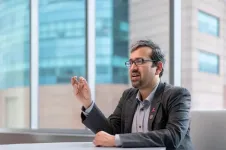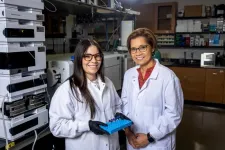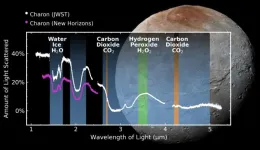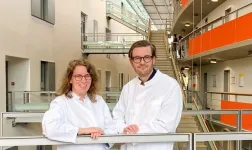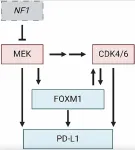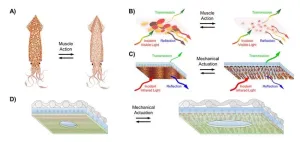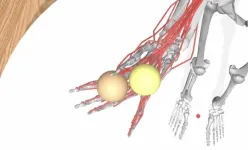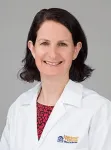(Press-News.org) St. Jude Children’s Research Hospital today announced M. Madan Babu, PhD, FRS, as the institution’s first Chief Data Scientist, Senior Vice President for Data Science, and leader of the newly formed Office of Data Science. This $195 million research enterprise will have 115 new positions.
In his new role, Babu will bring new, advanced computing technologies and data science approaches to biomedical research. His team will also facilitate the integration of biological and biomedical data, foster a data science research culture, and build international collaborations.
“Our ability to quickly analyze huge datasets is becoming increasingly crucial to scientific breakthroughs, particularly when it comes to biochemistry and cell biology,” said James R. Downing, MD, president and CEO of St. Jude. “Under the leadership of Dr. Babu, a globally recognized expert in this field, our Office of Data Science will strengthen data-sharing between the lab and the clinic, accelerating our progress in finding cures and developing treatments for children with catastrophic diseases.”
“Dr. Babu is a pioneer in developing and applying data science-based approaches to reveal fundamental principles of biological systems,” said J. Paul Taylor MD, PhD, executive vice president and scientific director. “Through this initiative, we aim to create a seamless scientific ecosystem where experimental, clinical and data scientists collaborate effectively to advance our understanding of healthy and disease states.”
The expanding role of data science in biomedical research
St. Jude accelerated its journey into data science with genomic studies and their associated molecular and clinical data, providing data and analysis resources to the global research community. Today, there are an estimated 150 petabytes of biological data from open sources. The explosion of different types of data in recent years such as imaging, structural, chemical, and population data has increased both the complexity and sheer amount of biological information available to scientists who need to translate the data into findings and then cures. The challenge is to integrate and derive actionable information from these large and diverse datasets.
“St. Jude is a unique place and I am honored to lead this initiative,” Babu said. “With our intellectual ecosystem of talented clinical, experimental and data scientists united under the same mission, there’s no better place than St. Jude to build a data science enterprise of this magnitude.”
Babu joined St. Jude in the Structural Biology department in 2020, following a 14-year tenure as a program leader at the MRC Laboratory of Molecular Biology in Cambridge, England. He is a recipient of the Gold Medal from the European Molecular Biology Organization and a recent inductee of the Academy of Medical Sciences and the Royal Society of London. He has made major contributions in the fields of G-protein coupled receptors, intrinsically disordered proteins and gene regulation.
Babu earned his PhD in computational genomics from Cambridge University and his undergraduate degree from Anna University, Chennai, India. Babu completed a postdoctoral fellowship at the National Institutes of Health, Bethesda, Maryland.
St. Jude Children's Research Hospital
St. Jude Children's Research Hospital is leading the way the world understands, treats and cures childhood cancer, sickle cell disease, and other life-threatening disorders. It is the only National Cancer Institute-designated Comprehensive Cancer Center devoted solely to children. Treatments developed at St. Jude have helped push the overall childhood cancer survival rate from 20% to 80% since the hospital opened more than 60 years ago. St. Jude shares the breakthroughs it makes to help doctors and researchers at local hospitals and cancer centers around the world improve the quality of treatment and care for even more children. To learn more, visit stjude.org, read St. Jude Progress, a digital magazine and follow St. Jude on social media @stjuderesearch.
END
St. Jude names M. Madan Babu, PhD, senior vice president and chief data scientist
He will lead new $195 million data science enterprise for biologic discovery to advance pediatric medicine
2024-10-01
ELSE PRESS RELEASES FROM THIS DATE:
It all adds up: Study finds forever chemicals are more toxic as mixtures
2024-10-01
BUFFALO, N.Y. — A first-of-its-kind study has measured the toxicity of several types of per- and polyfluoroalkyl substances (PFAS), better known as “forever chemicals,” when mixed together in the environment and in the human body.
The good news: Most of the tested chemicals’ individual cytotoxicity and neurotoxicity levels were relatively low.
The bad news: the chemicals acted together to make the entire mixture toxic.
“Though they are structurally similar, not all forever chemicals are ...
SwRI-led team discovers carbon dioxide and hydrogen peroxide on Pluto’s moon Charon
2024-10-01
SAN ANTONIO — October 1, 2024 — A Southwest Research Institute-led team has detected carbon dioxide and hydrogen peroxide for the first time on the frozen surface of Pluto’s largest moon, Charon, using observations from the James Webb Space Telescope. These discoveries add to Charon’s known chemical inventory, previously identified by ground- and space-based observations, that includes water ice, ammonia-bearing species and the organic materials responsible for Charon’s gray and red coloration.
“Charon is the only midsized Kuiper Belt object, in the range of 300 to 1,000 miles in diameter, that has been geologically mapped, thanks ...
More clarity on hereditary colorectal cancer
2024-10-01
The genetic confirmation of a suspected diagnosis of "hereditary colorectal cancer" is of great importance for the medical care of affected families. However, many of the variants identified in the known genes cannot yet be reliably classified in terms of their causal role in tumor formation. Under the leadership of the University Hospital Bonn (UKB) and the University of Bonn, an international team of researchers has reassessed the medical relevance of a significant number of unclear variants and thus significantly ...
FOXM1 and PD-L1 in CDK4/6-MEK resistance in nerve tumors
2024-10-01
“We suggest that future therapeutic strategies targeting the oncogenic network of CDK4/6, MEK, PD-L1, and FOXM1 represent exciting future treatment options for MPNST patients.”
BUFFALO, NY- October 1, 2024 – A new mini review was published in Oncotarget's Volume 15 on September 30, 2024, entitled, “Linking FOXM1 and PD-L1 to CDK4/6-MEK targeted therapy resistance in malignant peripheral nerve sheath tumors.”
As highlighted in the abstract of this paper, malignant peripheral nerve sheath tumors (MPNSTs) are aggressive, Ras-driven sarcomas characterized ...
McMaster University researchers identify new therapeutic approach to preventing cancer from spreading to the brain
2024-10-01
Researchers at McMaster University have identified a new therapeutic approach to preventing cancer from spreading to the brain.
In a new study, published recently in the journal Cell Reports Medicine, researchers Sheila Singh and Jakob Magolan discovered a critical vulnerability in metastatic brain cancer, which they say can be exploited with new drugs to prevent spread.
Singh, a professor in McMaster’s Department of Surgery and director of the Centre for Discovery in Cancer Research, says brain metastases are becoming increasingly prevalent and are extremely fatal, with 90 per cent of patients dying within one ...
Squid-inspired fabric for temperature-controlled clothing
2024-10-01
WASHINGTON, October 1, 2024 – Too warm with a jacket on but too cold without it? Athletic apparel brands boast temperature-controlling fabrics that adapt to every climate with lightweight but warm products. Yet, consider a fabric that you can adjust to fit your specific temperature needs.
Inspired by the dynamic color-changing properties of squid skin, researchers from the University of California, Irvine developed a method to manufacture a heat-adjusting material that is breathable and washable and can be integrated into flexible fabric. They published their ...
Using antimatter to detect nuclear radiation
2024-10-01
WASHINGTON, Oct. 1, 2024 – Nuclear fission reactors act as a key power source for many parts of the world and worldwide power capacity is expected to nearly double by 2050. One issue, however, is the difficulty of discerning whether a nuclear reactor is being used to also create material for nuclear weapons. Capturing and analyzing antimatter particles has shown promise for monitoring what specific reactor operations are occurring, even from hundreds of miles away.
In AIP Advances, by AIP Publishing, researchers from the University of Sheffield and the University of Hawaii developed ...
Modeling the minutia of motor manipulation with AI
2024-10-01
In neuroscience and biomedical engineering, accurately modeling the complex movements of the human hand has long been a significant challenge. Current models often struggle to capture the intricate interplay between the brain's motor commands and the physical actions of muscles and tendons. This gap not only hinders scientific progress but also limits the development of effective neuroprosthetics aimed at restoring hand function for those with limb loss or paralysis.
EPFL professor Alexander Mathis and his team have developed an AI-driven approach that ...
Survival gap eliminated for Black cord blood recipients with blood cancers, study finds
2024-10-01
Patients who receive umbilical cord blood transplants for blood cancers now live equally long regardless of their race, new research from UVA Cancer Center shows.
The findings, from UVA Health’s Karen Ballen, MD, and collaborators, suggests that a previously identified survival gap for Black recipients has closed and that overall survival for all recipients has increased.
The retrospective analysis looked at more than 2,600 adults and children with blood cancers who received cord blood between 2007 and 2017 ...
Nominate a stroke hero today: 2025 Stroke Hero Awards open for submissions
2024-10-01
DALLAS, Oct. 1, 2024 – Strokes can strike at any age, challenging survivors to overcome physical, emotional and cognitive changes. Nominations are open now for the 2025 Stroke Hero Awards from the American Stroke Association, a division of the American Heart Association, which is celebrating a century of lifesaving impact this year. The awards recognize stroke survivors, caregivers, advocates and experts making a difference in the stroke community.
Every 40 seconds someone in the U.S. has a stroke[1], according to the American Heart Association’s 2024 Heart Disease and Stroke Statistical Update. Nearly 1 in 4 stroke survivors face the ...
LAST 30 PRESS RELEASES:
New knowledge on heritability paves the way for better treatment of people with chronic inflammatory bowel disease
Under the Lens: Microbiologists Nicola Holden and Gil Domingue weigh in on the raw milk debate
Science reveals why you can’t resist a snack – even when you’re full
Kidney cancer study finds belzutifan plus pembrolizumab post-surgery helps patients at high risk for relapse stay cancer-free longer
Alkali cation effects in electrochemical carbon dioxide reduction
Test platforms for charging wireless cars now fit on a bench
$3 million NIH grant funds national study of Medicare Advantage’s benefit expansion into social supports
Amplified Sciences achieves CAP accreditation for cutting-edge diagnostic lab
Fred Hutch announces 12 recipients of the annual Harold M. Weintraub Graduate Student Award
Native forest litter helps rebuild soil life in post-mining landscapes
Mountain soils in arid regions may emit more greenhouse gas as climate shifts, new study finds
Pairing biochar with other soil amendments could unlock stronger gains in soil health
Why do we get a skip in our step when we’re happy? Thank dopamine
UC Irvine scientists uncover cellular mechanism behind muscle repair
Platform to map living brain noninvasively takes next big step
Stress-testing the Cascadia Subduction Zone reveals variability that could impact how earthquakes spread
We may be underestimating the true carbon cost of northern wildfires
Blood test predicts which bladder cancer patients may safely skip surgery
Kennesaw State's Vijay Anand honored as National Academy of Inventors Senior Member
Recovery from whaling reveals the role of age in Humpback reproduction
Can the canny tick help prevent disease like MS and cancer?
Newcomer children show lower rates of emergency department use for non‑urgent conditions, study finds
Cognitive and neuropsychiatric function in former American football players
From trash to climate tech: rubber gloves find new life as carbon capturers materials
A step towards needed treatments for hantaviruses in new molecular map
Boys are more motivated, while girls are more compassionate?
Study identifies opposing roles for IL6 and IL6R in long-term mortality
AI accurately spots medical disorder from privacy-conscious hand images
Transient Pauli blocking for broadband ultrafast optical switching
Political polarization can spur CO2 emissions, stymie climate action
[Press-News.org] St. Jude names M. Madan Babu, PhD, senior vice president and chief data scientistHe will lead new $195 million data science enterprise for biologic discovery to advance pediatric medicine
